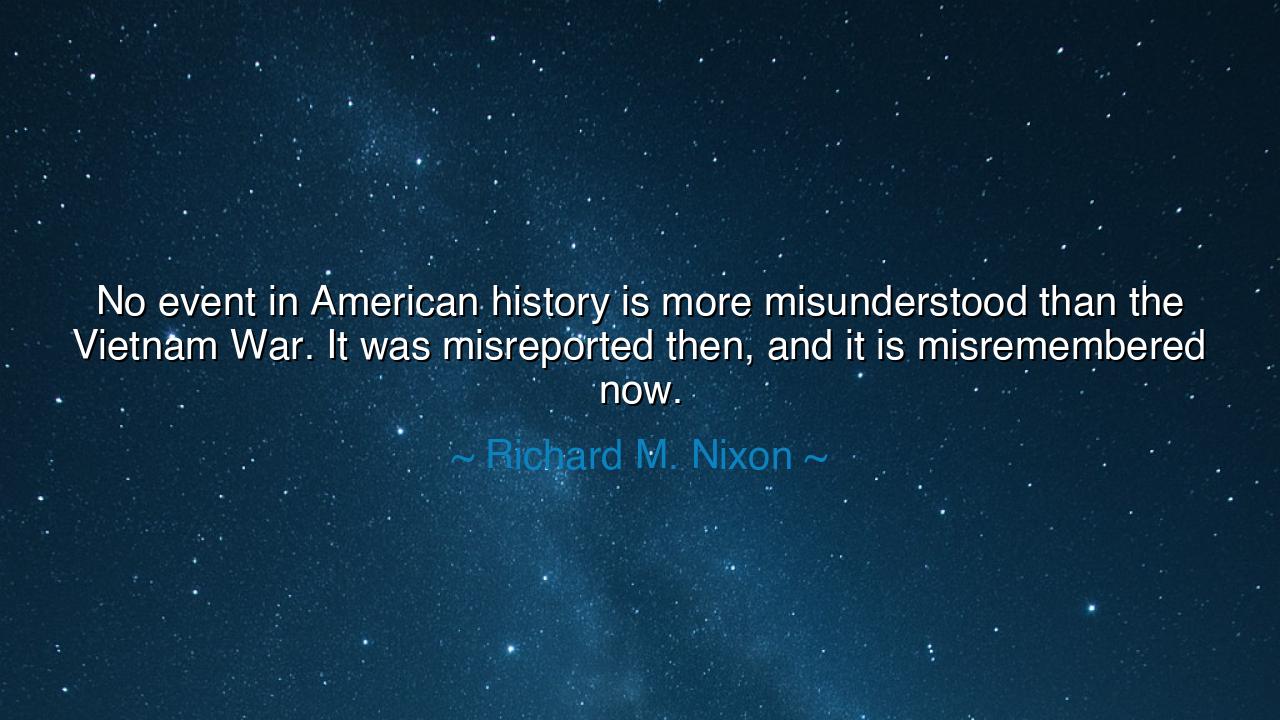
No event in American history is more misunderstood than the
No event in American history is more misunderstood than the Vietnam War. It was misreported then, and it is misremembered now.






In the solemn words of Richard M. Nixon, the shadows of history stir: “No event in American history is more misunderstood than the Vietnam War. It was misreported then, and it is misremembered now.” These are not the words of a man seeking absolution, but of one bearing witness to the deep tragedy of perception itself. For in these words lies a truth as old as civilization—that the story of war is not written on the battlefield, but in the hearts and minds of those who watch, interpret, and remember. The clash of nations may end, but the struggle for truth endures long after the last shot is fired.
The Vietnam War was not merely a conflict of armies; it was a war of beliefs, of worldviews, of narratives competing for the soul of an age. Fought in the jungles of Southeast Asia, it became a mirror reflecting the turmoil of an entire generation. Young men were sent to fight a war whose purpose they did not always understand, while those at home questioned the morality, the strategy, and even the truth of what they were told. The press, once the herald of glory, became a battlefield of its own—images of suffering and chaos reaching into every American home. Nixon’s lament, that the war was misreported then, speaks to this storm of perception: where courage was overshadowed by scandal, where sacrifice was drowned by protest, and where victory and defeat were often measured by the lens, not the ground.
But his second sorrow, that it is misremembered now, cuts even deeper. Memory, like history, is a living thing—it shifts, it forgets, it forgives selectively. As generations pass, the war becomes a symbol rather than an experience. For some, it is remembered as a failure of leadership; for others, a noble struggle against tyranny. Yet in both extremes, much of the human truth is lost—the bravery of soldiers, the suffering of the Vietnamese people, the divisions that tore America apart. In this way, the Vietnam War became not only a wound of the body, but a wound of the spirit, where truth itself became a casualty.
Consider the story of the Tet Offensive in 1968. Though militarily repelled, it was broadcast as a devastating defeat. The images of chaos in Saigon and Hue eclipsed the reality that North Vietnamese forces had failed in their aims. Yet the battle was lost not on the field, but in the realm of perception. The American people, weary and disillusioned, saw only despair. Thus, the war that might have been endured for strategy’s sake was undone by the war of images and words. Nixon, inheriting that turmoil, learned too late that in the modern age, the truth of an event is not always the truth that survives.
This, then, is the tragedy of misunderstanding: when the noise of interpretation drowns the silence of contemplation. Every age has its Vietnam—its moment when the world rushes to judge before it seeks to understand. The ancients taught that history is the teacher of wisdom, yet wisdom cannot be born of distortion. When a people lose the ability to discern truth from tale, they lose not only their past but their future. For the stories we tell about our history shape the choices of those yet to come.
But there is hope in this reflection. For Nixon’s words, though heavy with regret, also bear a warning of redemption. To study the past honestly—to see not only what was done, but how it was seen—is to reclaim integrity. If the war was misreported, let us report better. If it is misremembered, let us remember rightly. Let us look upon history not as a weapon to wield, but as a mirror to understand ourselves. Truth, though obscured, is never wholly lost—it awaits those brave enough to seek it through humility and inquiry.
So, my children of the future, take this teaching to heart: do not let the noise of the present distort the truth of the past. When you read of wars, of leaders, of failures and triumphs, look beyond the headline, beyond the legend. Ask not only what happened, but who told the story—and why. For history is not a static monument but a living river, shaped by every voice that dares to speak of it.
And remember this eternal wisdom: that understanding must triumph over judgment, and truth must outlive the passions of its age. In honoring that, we heal the wounds of misunderstanding—not only of Vietnam, but of every human conflict where memory and meaning have gone astray. Thus, through the discipline of truth and the courage of reflection, we become not prisoners of history, but its wise inheritors.






AAdministratorAdministrator
Welcome, honored guests. Please leave a comment, we will respond soon